Watson may be a fixed point in a changing age, but Maddy Weymouth breathes new life into an ageless character
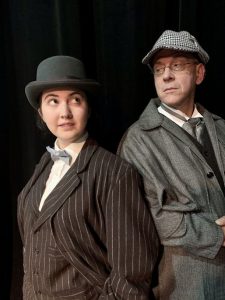 If you scroll down the list of actors who’ve portrayed Dr. John Watson in film, you’ll come across names like Jude Law, Ben Kingsley, James Mason, Dudley Moore and Robert Duvall. But you won’t find a single woman cast in the iconic role.
If you scroll down the list of actors who’ve portrayed Dr. John Watson in film, you’ll come across names like Jude Law, Ben Kingsley, James Mason, Dudley Moore and Robert Duvall. But you won’t find a single woman cast in the iconic role.
You won’t find any female actors who’ve tackled the role on stage, in radio or in audio dramas either.
In fact, you’ll only find two women with the talent and temerity to tackle the part in any medium. One is Tao Tsuchiya in the Japanese television series IQ246: The Cases of a Royal Genius. The other is Ally McBeal/Kill Bill icon Lucy Liu, and she actually plays Dr. Joan Watson in the long-running U.S. series 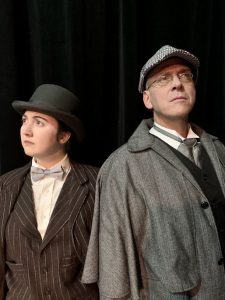 Elementary.
Elementary.
So it was an interesting choice when Theatre Conspiracy at the Alliance Director Rachael Endrizzi chose Madelaine Weymouth for the role in Ken Ludwig’s Baskerville: A Sherlock Holmes Mystery.
“Rachael didn’t mind casting a female in the role of Watson, but she emphasized from the first day of rehearsals that people are expecting to see Watson regardless of whether he’s being played by a man or a woman,” Weymouth pointed out in a recent interview at a café table outside a local Starbucks.
 Fresh from portraying decidedly feminine characters – the seductively manipulative Vanda in Venus in Fur (The Studio Players) and the abashedly naive but simmeringly sensual Robyn in Sex Tips for Straight Women from a Gay Man (Lab Theater) – playing Dr. Watson presents Weymouth with a unique but freeing opportunity – to move past playing either a man or a woman to focusing on the character, pure and simple.
Fresh from portraying decidedly feminine characters – the seductively manipulative Vanda in Venus in Fur (The Studio Players) and the abashedly naive but simmeringly sensual Robyn in Sex Tips for Straight Women from a Gay Man (Lab Theater) – playing Dr. Watson presents Weymouth with a unique but freeing opportunity – to move past playing either a man or a woman to focusing on the character, pure and simple.
Of course, she’s aided in this important endeavor by a handful of  essential realities. Watson is not someone who’s full of bravado or machismo, like a Stanley Kowalski. Notwithstanding his reputedly good uppercut and the stamina of a draft horse, Watson’s more about intellect, common sense, loyalty and admiration – qualities that can be possessed by either gender. But the emphasis on character over gender delivers two advantages that better enable
essential realities. Watson is not someone who’s full of bravado or machismo, like a Stanley Kowalski. Notwithstanding his reputedly good uppercut and the stamina of a draft horse, Watson’s more about intellect, common sense, loyalty and admiration – qualities that can be possessed by either gender. But the emphasis on character over gender delivers two advantages that better enable 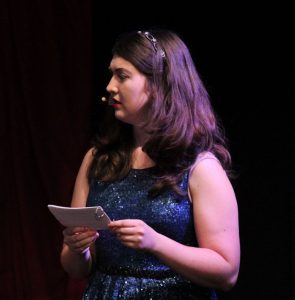 Weymouth to express her own and Endrizzi’s vision not only of the character of John Watson, but of his relationship to Sherlock Holmes.
Weymouth to express her own and Endrizzi’s vision not only of the character of John Watson, but of his relationship to Sherlock Holmes.
Making a character your own is the penultimate challenge that every actor faces. Playing Dr. Watson presents two nearly insurmountable obstacles.
The first involves ignoring prior performances, many by legendary actors like Law, Mason and Duvall.
“There’s the Jude Law version and the BBC version in your head and the 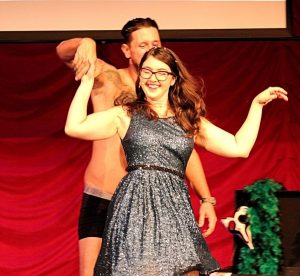 new Steven Moffat version, and it’s hard not to take any of these versions with you when you undertake the role,” Maddy acknowledges with a smile. “It’s hard not to do the Martin Freeman exasperation, for instance, or the Jude Law stoicism. I’ve done roles that other people have done before, but it’s easy to block them out because I haven’t seen the 1950s film on which the story is based. But there’s a big difference between having to put an iconic performance out of your mind
new Steven Moffat version, and it’s hard not to take any of these versions with you when you undertake the role,” Maddy acknowledges with a smile. “It’s hard not to do the Martin Freeman exasperation, for instance, or the Jude Law stoicism. I’ve done roles that other people have done before, but it’s easy to block them out because I haven’t seen the 1950s film on which the story is based. But there’s a big difference between having to put an iconic performance out of your mind  and having to put previous iterations of an iconic character out of your mind in order to make the character present and real.”
and having to put previous iterations of an iconic character out of your mind in order to make the character present and real.”
A character like Watson comes with expectations, and there’s risk associated with disregarding the lore that has come to imbue a character that people know and love, even if they’ve never read the first word of one of Arthur Conan Doyle’s novels, novellas or short stories.
 “People who’ve never read or seen Sherlock Holmes know who he and Watson are because they’re so ingrained in the culture,” Weymouth observes. “It’s like playing a Disney princess. Audiences come with a certain expectation and the challenge is making them feel comfortable with my John Watson … without copying what comes before. I’m trying to insinuate myself into 130 years of canon, and I’m trying to make myself worthy of being able to do something fresh and new with that character.”
“People who’ve never read or seen Sherlock Holmes know who he and Watson are because they’re so ingrained in the culture,” Weymouth observes. “It’s like playing a Disney princess. Audiences come with a certain expectation and the challenge is making them feel comfortable with my John Watson … without copying what comes before. I’m trying to insinuate myself into 130 years of canon, and I’m trying to make myself worthy of being able to do something fresh and new with that character.”
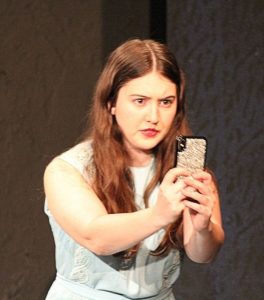 In pop cadence, Watson is commonly regarded as Sherlock Holmes’ sidekick. Although he doesn’t possess Holmes’ insights and genius, he’s clever in his own right and possesses a high degree of common sense or street smarts. And to bring out the fact that Watson is his own person, Ken Ludwig removes Sherlock Holmes from the storyline in Baskerville for a while, leaving Watson to his own mettle to try and figure out what’s going on.
In pop cadence, Watson is commonly regarded as Sherlock Holmes’ sidekick. Although he doesn’t possess Holmes’ insights and genius, he’s clever in his own right and possesses a high degree of common sense or street smarts. And to bring out the fact that Watson is his own person, Ken Ludwig removes Sherlock Holmes from the storyline in Baskerville for a while, leaving Watson to his own mettle to try and figure out what’s going on.
“That elevates Watson from mere sidekick to a stand-in for the audience,” Weymouth continues. “You see him analyzing clues and trying to solve the crime. He’s a co-sleuth. There are things  that happen that only Watson is privy to. Watson even makes observations that take Holmes aback and cause him to say, ‘I never thought of it like that.’ That’s because Watson approaches problem-solving from a different perspective. Of course, that’s not to intimate that Watson is on the same level of intellect as Sherlock. He’s not. Watson is an Everyman.”
that happen that only Watson is privy to. Watson even makes observations that take Holmes aback and cause him to say, ‘I never thought of it like that.’ That’s because Watson approaches problem-solving from a different perspective. Of course, that’s not to intimate that Watson is on the same level of intellect as Sherlock. He’s not. Watson is an Everyman.”
He also functions at times in the play as a narrator, stepping away from the action to speak directly to the audience.
Another  characteristic that makes Watson an ideal stand-in for the audience is his respect and admiration for his friend.
characteristic that makes Watson an ideal stand-in for the audience is his respect and admiration for his friend.
“This is mentioned on the very first page of Ken Ludwig’s script –Watson introduces Sherlock as one of the greatest men he’s ever known. Not one of the greatest detectives. Not one of the greatest friends. But one of the greatest men. And there’s a large sense of admiration that Watson has for Sherlock. He doesn’t approve of all of his decisions – like smoking –  but he recognizes Sherlock’s intellect for what it is. He trusts him completely. He’s very loyal. In the Ken Ludwig version, they’re not only crime-solving buddies, they’re also the best of friends. But it’s deeper. There’s probably a part of Watson that wishes he were Sherlock, but an even larger part that is glad he’s not.”
but he recognizes Sherlock’s intellect for what it is. He trusts him completely. He’s very loyal. In the Ken Ludwig version, they’re not only crime-solving buddies, they’re also the best of friends. But it’s deeper. There’s probably a part of Watson that wishes he were Sherlock, but an even larger part that is glad he’s not.”
But there’s more.
Watson doesn’t just help the super-sleuth solve the crimes Holmes is called in to investigate. He’s there to take notes and chronicle what Sherlock does. In fact, points out Weymouth, without the notes Watson jots down, there’d be no stories to recount – which perhaps explains why the character of Dr. John Watson figures prominently in 56 of the 60 separate stories that form Arthur Conan Doyle’s Sherlock Holmes anthology.
In addition to all the challenges that went with ignoring precedent in the overarching effort to fashion a character unique to her own and Rachel Endrizzi’s vision, there was another tiny complication. The play requires Weymouth and her cast mates to master accents and arcane language in order to pull off their respective roles.
“Unlike Thomas Marsh, Shelley Sanders and Jordan Wilson who must change accents and outfits with every character change, I only had to master a simple British accent,” Weymouth noted, slipping seamlessly into RP (Received Pronunciation), which is the stereotypical accent spoken mainly in the south of England.
But that doesn’t mean that memorizing and delivering her lines was a snap.
“Ludwig employs almost the exact same language as appears in Arthur Conan Doyle’s novels, which is cool for those audience members who are big fans of the books,” Weymouth explains. “But it is also a fun challenge for an actor to make words written in 1894 make sense for the audience. And it’s definitely a challenge to memorize.”
Weymouth has been a Sherlock Holmes fan since she was (yes, I dare to say it) in elementary school.
“My mom read me Hound of the Baskervilles as a bedtime story. I remember the cover with the black outline of a dog with red eyes and being terrified of the hound as a little girl. But you don’t have to have read any of Arthur Conan Doyle’s books or novellas to enjoy Baskerville. It’s like a pop culture reference. It won’t interfere with your understanding of the play if you haven’t, but if you have, it will heighten your enjoyment of the story.”
Like Lab Theater’s recently-concluded production of Death of a Streetcar Named Virginia Woolf.
“And even though it’s a farce, it’s a real whodunit,” Weymouth quickly adds. “It’s a lot like Knives Out in that it’s ridiculous and hilarious but you’re still trying to figure out what’s going on.”
It’s been an interesting, exciting and challenging exercise, but Weymouth thinks she’s negotiated the transformation fairly well. She credits Endrizzi’s direction and the strength of the rest of the cast with that.
“The nice thing about this show is that every other actor who’s on stage has more experience than me, so I get to watch, listen and learn. For instance, Rob Green is Sherlock and to have such a strong Sherlock makes my job easier. He’s always so self-confident and sure. That inspires me to also be confident and sure.”
“You’ll have to come and see how I made out,” Maddy challenges.
Okay, I’ll be there.
Will you?
February 12, 2020.














 Tom Hall is both an amateur artist and aspiring novelist who writes art quest thrillers. He is in the final stages of completing his debut novel titled "Art Detective," a story that fictionalizes the discovery of the fabled billion-dollar Impressionist collection of Parisian art dealer Josse Bernheim-Jeune, thought by many to have perished during World War II when the collection's hiding place, Castle de Rastignac in southern France, was destroyed by the Wehrmacht in reprisal for attacks made by members of the Resistance operating in the area. A former tax attorney, Tom holds a bachelor's degree as well as both a juris doctorate and masters of laws in taxation from the University of Florida. Tom lives in Estero, Florida with his fiancee, Connie, and their four cats.
Tom Hall is both an amateur artist and aspiring novelist who writes art quest thrillers. He is in the final stages of completing his debut novel titled "Art Detective," a story that fictionalizes the discovery of the fabled billion-dollar Impressionist collection of Parisian art dealer Josse Bernheim-Jeune, thought by many to have perished during World War II when the collection's hiding place, Castle de Rastignac in southern France, was destroyed by the Wehrmacht in reprisal for attacks made by members of the Resistance operating in the area. A former tax attorney, Tom holds a bachelor's degree as well as both a juris doctorate and masters of laws in taxation from the University of Florida. Tom lives in Estero, Florida with his fiancee, Connie, and their four cats.